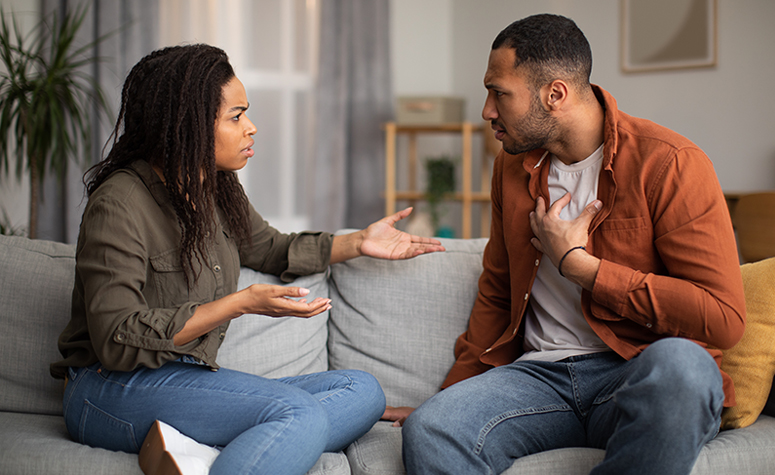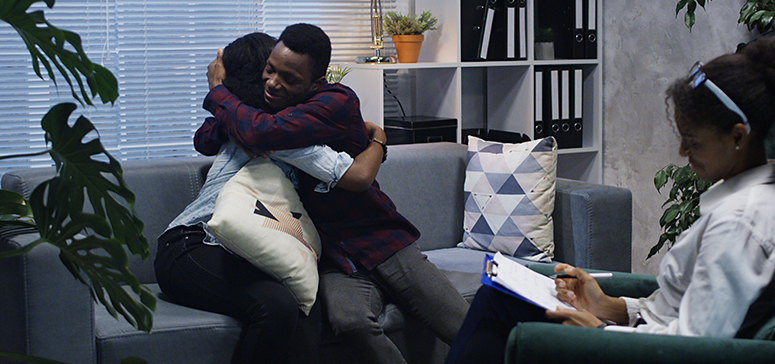Codependency and Addiction Explained
Codependency is a unique form of addiction that’s not tied to substances but rather to an excessive emotional or psychological dependence on another person. This pattern is often observed in relationships where one party struggles with addiction or mental health issues. It’s crucial to recognise that codependent dynamics can develop in a variety of contexts, not exclusively in those involving addictive behaviours.
This page delves into the nature of codependency, highlighting its signs, symptoms, and the risks associated with codependent relationships.
What is Codependency?
‘Codependency’ describes a relationship where one individual becomes so emotionally intertwined with another that their independent functioning becomes highly challenging. This is particularly pronounced when the other party is contending with chronic illness or suffering some form of addiction.
In contexts involving addiction, the codependent person will go to great lengths to please the addict, driven by a fear of rejection, thus perpetuating the addict’s harmful behaviour.
Codependents typically have low self-esteem and rely on external validation. They may lose their sense of self and, in some instances, engage in substance-seeking behaviours alongside the addict to feel connected or accepted.
The intensity of codependent feelings and behaviours varies. Like any illness, including addiction, if left unaddressed, the symptoms can become compulsive and worsen over time with damaging effects to all concerned.

Signs and symptoms of Codependency
People exhibiting codependent traits often follow a consistent pattern of behaviour that can be detrimental to their emotional well-being and their ability to engage in healthy relationships with others.
Key signs of codependency include an excessive need to take care of others, a tendency to control or manage, and an obsession with people or things outside of oneself.
One significant problem in codependent relationships is the inadvertent enabling of an addict’s harmful behaviour.
By trying to express love through ‘helping’ the addicted partner, a codependent person might inadvertently hinder them from seeking the necessary treatment for recovery.
Such enabling behaviour can manifest in numerous ways, such as acquiring drugs for the addict, underestimating the gravity of their condition, or even participating in the addiction to connect with the addict.
The codependent partner might mistakenly believe that this form of support could aid the addict. Ultimately, the addict becomes reliant on the codependent, providing no motivation to change their behaviour.

The dangers of a codependent relationship
The risks associated with a codependent relationship are twofold: the addict is unlikely to overcome addictive behaviours or find motivation for treatment, and the co-dependent is unlikely to address their deep-rooted identity issues.
Codependents are more vulnerable to physical and emotional abuse, often taking extreme measures to conceal injuries. Due to the nature of addiction, they’re prone to manipulation into dangerous behaviours on the addict’s behalf, potentially leading to their own addictions or criminal involvements.
Furthermore, the addict, lacking any real motivation for treatment, faces severe risks like health complications, deepening dependency, overdose, and potentially, death.
The impact on children in codependent relationships is particularly profound. Children raised in environments dominated by addiction are more likely to suffer from a range of issues, including an increased likelihood of developing addictions, mental health challenges, and even perpetuating the cycle of codependency in their future relationships.
FREE Addiction Assessment
If you or a loved one are struggling with addiction, we understand the challenges you’re facing and we’re here to offer compassionate help.
Our highly trained advisers are available to speak to you right away, simply call 0808 252 3379 today.
We can discuss your concerns in complete confidence, explore the options for treatment, and help you to understand what will work best for you.
We’ll also help you to book your free addiction assessment there and then, with appointments usually available within only a few days.
We understand that taking the first step can be the most difficult, but we’re here to support – with no pressure or judgement.
Professional and compassionate help is just a phone call or click away.




